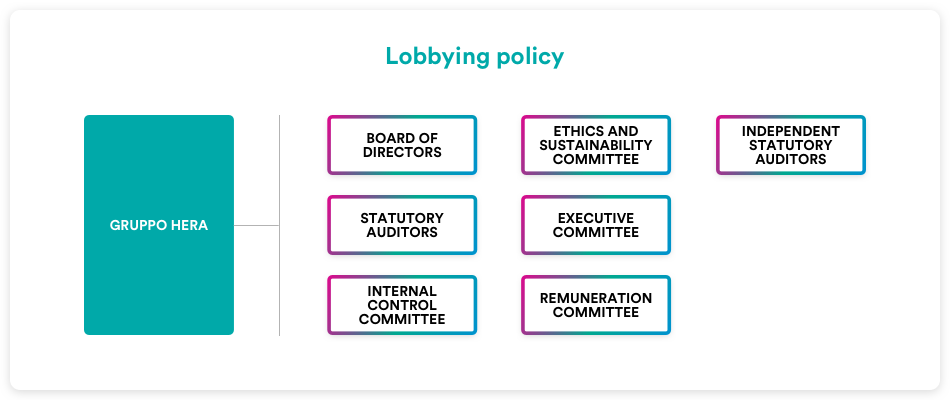Corporate governance system
Hera main target is to create shared value for its stakeholders.
As a consequence, Hera Corporate Governance system is effective to evaluate and assess the inputs from an increasingly complex economic and social context. The strong roots in the geographical areas of operation are strengthened as a result of unceasing dialogue which consists in developing an open, transparent “way of doing business”. This distinctive characteristic has resulted in the creation of corporate boards which, in accordance with Corporate governance code promoted by Borsa italiana and Code of ethics, complement each other in order to best fulfil the expectations of all stakeholders.
Corporate interactive chart
Select a corporate body within the organisational chart to know more about its role and members
Selected corporate body:
DESCRIPTION
RELATIONSHIPS
PEOPLE
The shareholders’ meeting is the body that passes the company’s resolutions. The tasks fulfilled during ordinary shareholders’ meetings include: approving financial statements, appointing the board of directors, deciding on their remuneration and examining the issues put forward by the directors.
Extraordinary meetings decide upon modifications of the Articles of Association and operations such as share capital increases and merger projects. The meeting represents ownership claims, i.e. the company’s shareholders.
The 2022 Shareholders’ meeting granted the assignment for auditing the financial statements, the consolidated financial statements and the performance of all the activities envisaged by Legislative decree 58/98, as amended, to the independent auditors company KPMG Spa.
The assignment has a total duration of 9 financial years and will expire on the date of approval of the financial statements as at 31.12.2032
The Board of Statutory Auditors is the body that supervises the Group’s correct administration, assessing the adequacy of the organisational, administrative and accountancy systems designed by the directors. Its structure is regulated by Article 26 of the Articles of Association.
It holds a wide mandate for the ordinary and extraordinary management of the Company, and is able to carry out any and all actions and operations deemed necessary to reach the Group’s targets.
Its responsibilities include:
Nomination or dismissal of the Chairman, the Vice Chairman, the C.E.O. and the general directors;
Definition of the powers devolved to the Chairman, the C.E.O., the general directors and the Executive Committee;
Approval of multi-year strategies and the business plan;
Acquisition or sale of companies or branches of companies.
BoD's mandate will end by the AGM to approve the 2025 Financial Statements.
The Remuneration Committee is assigned the task of making proposals to the Board of Directors for the remuneration of the Chairman, the Vice Chairman, the C.E.O., the General Managers, as well as the adoption of general criteria for determining management remuneration, the C.E.O. being nonetheless tasked with providing policies and levels for such remuneration.
The Committee furthermore periodically evaluates the adequacy, overall coherence and concrete implementation of the general policies adopted for the remuneration of directors and general managers.
In carrying out its functions, the Remuneration Committee has the possibility of gaining access to any information and company functions that may prove necessary.
It should be noted that at least one of the members of the Committee has experience in accounting and finance, deemed adequate by the Board of Directors at the time of appointment.
In order to ensure a widespread implementation of the Code of Ethics, the Board of Directors established the Ethics and Sustainability Committee on 8 October 2007.
The committee has the task of assessing the compliance of company conduct with the principles of the Code of ethics and of heading investigations upon receiving reports of violations. Furthermore, since 2018, this committee is responsible for monitoring the implementation of sustainability policies; formulate, upon request of the Board of Directors, an opinion on specific sustainability issues; examine the corporate procedures on social and environmental issues; examine the sustainability report before submission to the Board of Directors
This committee is composed of four members of which at least one director from the B.o.D. and two experts in Corporate social responsibility and the issues dealt with in Legislative decree 231/01.
Article 23.3 of the Articles of Association provides that the Board of Directors may appoint an Executive Committee and establish its powers. This body has the duty of expressing an opinion, prior to submittal to the Board of Directors, concerning particularly important issues: Annual definition of the Group’s Business Plan; Definition of the Budget; Drafting the Financial Statements; Proposing the appointment of top-level managers.
The Committee also has decisional power on issues with economic-financial implications for amounts exceeding the limits established for the Chairman and the C.E.O., but which are not strategically significant when compared to the Group’s overall economic-financial dimensions.
In accordance with Principle 8 of the Corporate Governance Code, the Internal Control Committee is tasked with overseeing the operation of the internal control system, the efficiency of company operations, the reliability of financial information, compliance with the law and regulations, and protection of company assets. It is also in charge of maintaining relationships with related parties, and expresses opinions that may be binding in cases of large-value transactions.
This body, composed of four non-executive and independent directors, has advisory and proposal-making functions.
Orazio Iacono
Chief Executive Officer of Hera Group
CV Link
Cristian Fabbri
Executive Chairman of the Hera Group and Chairman of the Executive Committee
CV Link
Gabriele Giacobazzi*
Vice President of Hera Group
CV Link
It requests an independent opinion as to the implementation of the Group’s accounting principles and their homogeneous application across its companies, and furthermore evaluates the correctness and dependability of the annual report.
It is called by the Board of Directors. It nominates the directors and approves their resolutions and financial and annual dividend proposals. It also defines the directors’ and the auditors’ remuneration
It elects the statutory auditors through a procedure of voting by lists. The chairman and the alternate auditor are chosen from the list obtaining the second highest number of votes. The remaining auditors are chosen from the list obtaining the highest number of votes.
They offer an independent opinion as to the implementation of the Group’s accounting principles and their homogeneous application across its companies, and furthermore evaluates the correctness and dependability of the financial statements
They illustrate assignments not related to audits carried out for the Group, elaborate proposals for the appointment of auditors, and supply information useful in monitoring the efficiency of the auditing process.
With the external auditors, it formulates an evaluation of the adequacy and efficiency of the accounting principles adopted, as well as their application to the Group’s companies.
It is independent from the shareholders that nominate it, in that it verifies that the board of directors acts with the aim of creating value indiscriminately for all shareholders.
It participates in the meetings of the Board of Directors and monitors the implementation of the objectives defined in its strategic plans. It evaluates the criteria followed by the Board of Directors in assessing the independence of the directors. It promptly provides information if and when a cause of non-independence of an auditor with respect to a given operation should emerge. It provides an opinion as to the remuneration of the executive directors and those with particular responsibilities.
It exchanges relevant information as to the completion of its tasks. The Chairman of the Board, or an auditor appointed by him, participates in the Committee’s meetings.
It monitors their independence, including the evaluation of assignments not related to audits carried out for the Group. It also assesses proposals for the appointment of auditors and monitors the efficiency of the auditing process.
It governs the company, carrying out all acts of ordinary and extraordinary administration, with the aim of creating value for stakeholders. It convenes shareholders’ meetings and develops proposals that, by law or according to its articles of association, fall under the responsibility of the meetings
It refers at least once every three months on completed activities and the most relevant current operations, as well as those in which the directors are personal stakeholders. It predisposes measures that are able to guarantee that the Board of Statutory Auditors’ tasks are carried out efficiently. At least three days prior to the meetings of the Board of Directors, it provides all documents and information necessary for the discussion of the items on the agenda.
The Board of Directors nominates or dismisses the members of the Executive Committee.
It elects the members of the committee and takes note of its views as to the general outline of the control system, the adequacy and efficiency of the system adopted, the appointment and dismissal of those accountable for control as well as their remuneration, the evaluations of the accountancy principles adopted and their application to the Group’s companies and, lastly, the investigations specifically requested by the executive committee.
It elects the members of the committee and takes note of its priorly expressed estimates concerning the remuneration of executive directors, directors with particular responsibilities and general directors, as well as the choice of general criteria for management remuneration.
It elects the members of the committee and receives its annual report concerning the implementation of the Code of Ethics and any information related to infractions of the code.
It presents proposals to the Board of Directors as to the remuneration of executive directors, directors with particular responsibilities and general directors, as well as the choice of general criteria for management remuneration.
It prepares an annual report concerning the implementation of the Code of Ethics and the investigations carried out on any infractions of the code that have emerged.
It defines working strategies and monitors the activity carried out. It can request opinions concerning the system of internal control.
It offers opinions as to the general outline of the control system, the adequacy and efficiency of the system adopted, the appointment and dismissal of those accountable for control as well as their remuneration, the evaluations of the accountancy principles adopted and their application to the Group’s companies. It refers at least twice yearly as to the operations carried out.
It exchanges relevant information as to the completion of its tasks. The Chairman of the Board, or an auditor appointed by him, participates in the Committee’s meetings.
With the external auditors, it formulates an evaluation of the adequacy and efficiency of the accounting principles adopted, as well as their application to the Group’s companies.
It expresses an opinion concerning the system of internal control, when explicitly required to do so by the supervisory executive director.
Lobbying policy
Political dialogue and lobbying with institutions are managed by Hera in an institutional manner through UTILITALIA.
Utilitalia brings together industry peers and represents them with national and European institutions.
It has among its partners the National Authorities, the parliamentary committees and the relevant ministries, with which it cooperates while designing bills and measures pertaining to public utility services of a certain economic relevance. It also represents the water, environment and energy business in Europe, through different sector organizations. This institution also dialogues and collaborates with universities, foundations, public bodies and research centers on issues related to public services and participates in technical committees, appointed by ministerial decree, in national and international associations, funds, working groups and research and science institutions and committees.
Lobbying activity through Utilitalia
In November 2015 the Group participated in the main event Ecomondo, the green technology exhibition held in Rimini and supported the lobby activities of Utilitalia listed here (in Italian).

Page updated 4 march 2024







